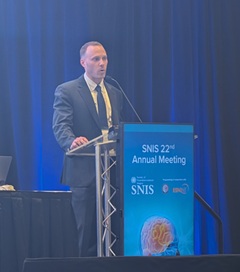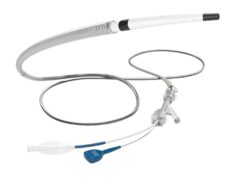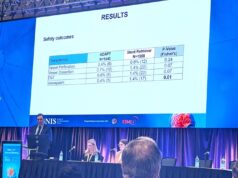
Route 92 Medical has today announced results from an independent, real-world study evaluating reperfusion outcomes following use of the company’s HiPoint reperfusion system—described by Route 92 as “the first and only” US Food and Drug Administration (FDA)-cleared 0.088-inch reperfusion catheter system for direct aspiration of large vessel occlusions (LVOs) in patients experiencing an acute ischaemic stroke. The study was presented at the Society of NeuroInterventional Surgery (SNIS) annual meeting (14–18 July, Nashville, USA) by Daniel Tonetti (Cooper University Health Care, Camden, USA).
The retrospective, multicentre study collected outcome data from 193 consecutive patients treated with Route 92’s HiPoint reperfusion system who were not part of the SUMMIT MAX trial. Its primary endpoints were modified thrombolysis in cerebral infarction (mTICI) 2c–3 and mTICI 2b–3 reperfusion at the first aspiration pass, with secondary endpoints including rate of successful aspiration catheter delivery, number of passes for final reperfusion, and conversion to other systems or devices.
In the study, clinicians successfully delivered the HiPoint reperfusion system to the stroke-causing occlusion in 96.2% of cases. In addition, the primary endpoint of first-pass mTICI 2c–3 was achieved in 57.5% of cases, with first-pass mTICI 2b–3 being achieved in 68.4% of cases. The median number of passes was one, Route 92 reports in a press release.
“We believed it was important to study the clinical utility of Route 92 Medical’s HiPoint reperfusion system as a first-line aspiration tool in a real-world environment,” said Tonetti. “As in SUMMIT MAX and in the SLIC [super large-bore ingestion of clot] publication, we observed strong delivery and first-pass effect data, as well as low complication rates. We’d expect these metrics to continue to improve as more clinicians and sites gain experience with the technology.”
At the ongoing SNIS meeting, Route 92 also introduced SUMMIT RISE—a prospective, 500-patient study to evaluate the efficacy of the company’s portfolio of neurovascular interventional solutions across a wide range of cases. The prospective, core lab-adjudicated study will begin immediately under the leadership of co-primary investigators Sunil Sheth (UT Health McGovern Medical School, Houston, USA), Christopher Kellner (Mount Sinai Health System, New York, USA), and Albert Yoo (Medical City Texas Stroke Institute, Plano, USA).
“As with all new medical technologies, it’s critically important to develop independent, real-world evidence to guide future clinical decision-making,” Sheth commented. “By collecting and analysing data prospectively, and having all cases reviewed through an independent adjudication process, the SUMMIT RISE study will enable us to evaluate the effectiveness of Route 92 Medical’s neurovascular interventional devices in real-world clinical use, and provide insights into technique optimisation and performance.”
“We believe the evidence base supporting the use of Route 92 Medical’s technologies in neurovascular interventional procedures continues to grow,” added Tony Chou, founder and chief executive officer (CEO) at Route 92. “With each new study, there is additional support for the use of our Tenzing-based intervention approach, showing its ability to safely and effectively reach and aspirate clots, while improving first-pass effect relative to other catheter products. With SUMMIT RISE, we plan to evaluate patient outcomes over time, across devices and sites, and to provide additional data showing that our tools achieve clinical objectives and help give patients the best opportunity to recover from acute ischaemic stroke.”










